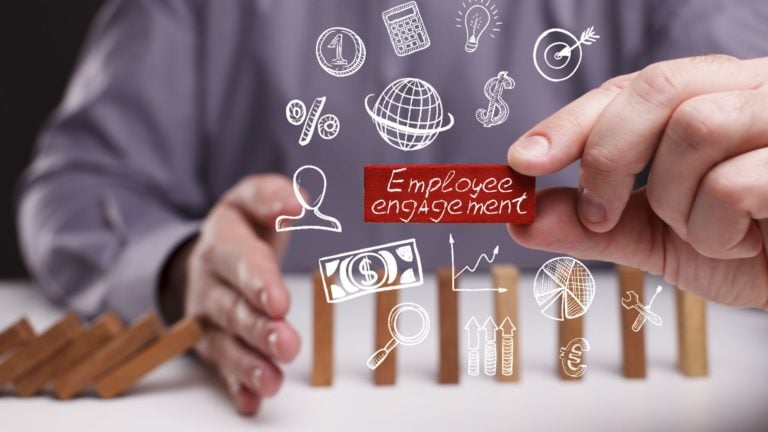Employee rewards make your team members feel valued, boosting their happiness, engagement, productivity, and loyalty. Read on for our 28 suggestions for ways to reward your employees.
Employees work hard to ensure a business runs smoothly, and this shouldn’t go unnoticed. Recognizing employees’ efforts can go a long way in fostering a positive work environment and boosting their morale.
But as a business owner or human resources (HR) manager, it can be challenging to think of ways to reward employees. You need to balance the needs of your business with those of your employees. You also need to think of ideas for rewarding deskless employees as well as any in-office workers you have.
In this article, we look at 28 effective ways to reward your employees, from simple gestures to more significant strategies. We know that every workplace and employee is unique, so we’ve included a variety of types of rewards and recognition for employees.
What Are Employee Rewards?
Employee rewards are gifts, cash, or other items or experiences given to employees to recognize their accomplishments at work. Employers usually reward employees for exceptional work or for meeting specific performance goals.
Rewards are a great way to say “thank you” to your employees. They acknowledge their good work and professional achievements. This makes your employees feel valued and appreciated.
The best thing is, you can choose the types of employee rewards you offer to suit your business and employees’ needs. Rewards can be monetary, like bonuses, or non-monetary, like a thank you card or a company party. You can deliver them through a structured rewards and recognition program, or they can be more spontaneous.
Most businesses use a combination of monetary and non-monetary rewards when designing their rewards plans. It’s good to have a range of options for rewarding your in-field employees as well as your office workers.
Similarly, keep the needs of your business in mind. Choose rewards that support your budget, company culture, and organizational values.
Importantly, take the time to understand your employees’ interests and preferences. With this information, you can tailor an effective rewards program for your workforce.
Why Are Rewards Important?
Rewards are essential for keeping employees satisfied and engaged. Even smaller or symbolic rewards can have a positive impact on employee satisfaction, performance, and retention.
By recognizing employees’ achievements and contributions, you make them feel valued. And when employees feel valued, they’re more motivated in their job, and their engagement and productivity increases.
Rewards also improve company culture and create a positive work environment, which helps boost employees’ job satisfaction and reduces the likelihood of workers quitting.
Additionally, rewarding employees—especially high performers—illustrates what success looks like in your organization. This motivates other employees to do the same, increasing productivity, profits, and customer satisfaction.
Rewards can also reduce turnover and absences in your business. When employees feel their efforts are overlooked, they feel undervalued and are more likely to quit. Feeling unappreciated can also affect employees’ well-being and make them more likely to miss work. Happier employees, on the other hand, help create a loyal workforce and reduce costs associated with hiring and training new team members.
What Makes a Reward Effective?
When coming up with ideas for rewarding remote employees, deskless staff, and in-office workers, be sure to keep these factors in mind.
Effective rewards should be a combination of the following:
- Meaningful. Personalized rewards that suit an individual’s interests and preferences are often the most memorable. Symbolic gestures, like a thank-you card, can be more effective than expensive rewards when done thoughtfully.
- Immediate. Recognizing employees’ contributions and achievements in real time is important. When employees are rewarded soon after an action, it’s easy for them to see the link between the two. This is an effective way to encourage employees to continue doing that good work.
- Regular. Regular rewards help create a strong culture of recognition within your organization. Rewards will become second nature to management rather than a once-a-year checkbox exercise, making employees feel appreciated all year round. A good way to do this is to set up a digital rewards and recognition program.
- Fair. Employee rewards don’t need to be identical. They can be adapted to suit individual employees. At the same time, you need to make sure rewards are given fairly and consistently. Employees who miss out on a reward may view it as favoritism and be demotivated. A transparent reward system ensures that your team earns and distributes rewards fairly.
28 Ideas for Rewarding Employees
Rewards and recognition for employees can include gifts, employee benefits, acknowledgment, cash, and experiences at or outside of the workplace.
If you’re looking for ideas for rewarding employees, the below list is a good place to start!
Gifts
- Gift cards. You can choose a gift card for your employees that suits their interests—for example, a voucher for the local coffee shop or movie theater. You can also use a tokens system, where employees earn tokens they can redeem for a gift card of their choice. Connecteam, for example, has a built-in tokens system.
- Tickets to music, sporting, or other events. Choose something that suits your employees’ interests. This gives them a chance to do something fun while feeling appreciated for the hard work they do during the workweek.
- Individual gifts. Selecting a gift for an employee can be more personal and memorable than a gift card. Keep in mind their interests or passions. For example, you could gift an avid baker a new cookbook or a hiking enthusiast a water bottle.
- Team gifts. Gift hampers or boxes are a good option for rewarding a group of employees. A range of companies offer corporate hampers made up of food, drinks, and home decor items.
- Company swag. You can also gift your employees company-branded items like sweaters, mugs, or mousepads. As well as rewarding your employees, this helps build your brand.
Employee benefits
- Day off for their birthday. Extra paid time off (PTO) on top of your business’s standard PTO allowance can be an impactful reward for many employees. Give them a day off to celebrate their birthday. As an added bonus, they’ll return to work rested and refreshed.
- Early clock-outs. Setting a specific date, such as the day after a certain project is completed, when employees can clock out early is a good way to reward them for a job well done.
- Time-off coupons. Instead of a designated day off, give your employees on-the-spot rewards in the form of time-off coupons. Once an employee has accrued enough, they can take off shifts or days of their choosing.
- Gym membership or discounts. Employees appreciate employers who support their well-being. Gym memberships or discount subscriptions are a great way to do this.
Recognition
- Thank-you emails, messages, or handwritten notes. A simple “thank you” delivered over a company-wide email can significantly boost employee morale. You can also send individual emails or messages to employees who prefer private recognition over public recognition. A handwritten note is even more personal. It means a lot to an employee when a manager takes the time to write to them, thanking them for their work.
- Shoutout in an internal newsletter. Recognizing an employee in your company newsletter showcases their achievements. This sets a positive example for others while boosting the individual employee’s morale.
- Employee-of-the-month program. This is a great way to recognize employees’ contributions and achievements regularly. It also incentivizes employees to deliver high-quality work.
- Employee milestone celebrations. Take the time to recognize a work anniversary, promotion, or recent qualification. A digital employee recognition program, such as Connecteam’s, is a great way to keep track of these. Plus, using a platform like this allows for peer-to-peer recognition, where employees can recognize their coworkers’ achievements.
Check out our Best Work Anniversary Gift Ideas for Employees
Create a culture of excellence with the #1 rewards app.
Connecteam makes rewarding and recognizing your employees simple and effective
Monetary rewards
- Bonus. A one-off cash payment on top of their wages lets employees spend the money how they want. Bonuses can be scheduled—for example, at the end of each financial year. They can also be used to incentivize certain performance targets or other behaviors.
- Pay raise. A lasting reward, pay raises are an excellent way to recognize long-term employees. They show appreciation for their loyalty, can increase their job satisfaction, and keep the employee engaged.
- Donation to a charity of their choice. As well as increasing employee morale, this shows your commitment to corporate social responsibility. Choosing a cause employees care about gives the reward a more personal touch.
- Stipend for a personal growth experience. In addition to professional development opportunities, give employees an allowance to spend on a personal growth experience of their choice. This could go toward anything from a sky diving session to foreign language lessons. In addition to being a reward, these experiences are often good conversation starters at a job site or in the office.
- Technology or equipment stipend. Employers often offer stipends for home office equipment for remote work, but you can also offer employees a set amount of money to buy other technology or equipment for on-site work, such as a tablet or any job-specific tools. These make your employees’ working arrangements more comfortable—-and employees are more likely to give their best work when they feel this way.
Professional experiences
- Increased autonomy. Offering high-performing employees greater decision-making power and independence can be a highly effective reward. Examples of this include letting employees choose their work site or add tasks to their own schedule checklists. Employees with more control over their work feel more empowered, are more engaged, and are held accountable.
- Professional development budget. Give your employees an allowance to purchase books, subscribe to trade magazines, or attend a conference. This helps your employees strengthen their current skills and learn new ones, and helps you build a knowledgeable and skilled workforce.
- Mentoring opportunities. One-to-one mentoring opportunities are especially meaningful rewards. They give employees face-to-face time with senior management and can help your staff become even more knowledgeable and skilled.
- Time to work on special projects. Involving your employees in projects outside of their usual work scope varies their day and increases engagement. This type of reward also provides an opportunity for professional growth.
Experiences outside of job sites or the office
- Team lunch. Take your team members out to a local restaurant for both a reward and team-building activity. This can also be a good way to bring your in-office and on-site employees together if you have both. It may also be more impactful than offering snacks in an office break room or food for remote workers and in-field employees at a job site.
- Lunch with the manager or supervisor. The chance to spend one-on-one time with a superior gives an employee individual attention. Plus, it offers management a chance to get to know the employee better.
- Team trivia night. A trivia night with snacks, drinks, and prizes, is a great way to thank your employees in a casual and relaxed setting.
- Art gallery tour, or other team outings. Organizing a trip to a local art gallery gives employees an enjoyable experience and a chance to get to know their colleagues outside of work. Other team outings to consider include a museum visit or a group cooking class.
- Games day. A company games day is a great way for employees to let off steam and get out of the office.
- End-of-year party. A company party is a great way to thank your employees for their contributions and is a meaningful experience your team will look forward to. Organize some specific activities or choose a theme to make it even more memorable.
Using Rewards to Enhance Employees’ Experience
Rewards can significantly impact the way an employee works and feels about their job. Rewarding your employees effectively can boost their morale, satisfaction, and engagement. By understanding what motivates your employees and tailoring your rewards program to their preferences, you can increase productivity and reduce employee turnover.
There are a lot of ways you can reward employees and show appreciation for their hard work—from simple things like a handwritten note to more significant gestures like extra time off or bonuses. The next time you’re stuck for ideas for rewarding remote employees, deskless workers, or in-office staff, try out some of the rewards ideas discussed in this article.




